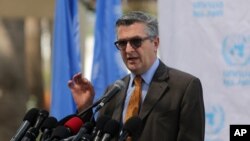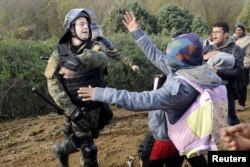The new U.N. High Commissioner for Refugees, Filippo Grandi, urges governments not to succumb to the growing dangers of xenophobia, but to offer protection to people fleeing war and persecution as set down in the 1951 Refugee Convention. The new refugee chief assumes his post at a time of unprecedented global displacement.
Filippo Grandi, a 58-year-old Italian national, is no newcomer to the agency he now leads. He worked for the UNHCR for many years before leaving 12 years ago to assume other positions in refugee organizations. His last job was as head of the U.N. Relief and Works Agency for Palestine Refugees.
Refugee crisis
Grandi, who replaces Antonio Guterres as High Commissioner, says the number of refugees and displaced people around the world has almost tripled, to around 60 million over the past 12 years. During this period, he says, Afghanistan has gone from being a country of repatriation to one that once again is producing refugees.
Grandi began working in Sudan in the late 1980s, in the midst of a civil war. He says the southern region of that country was churning out masses of refugees. Unfortunately, he says, the number of refugees in what is now South Sudan is three times higher since it became independent in 2011.
“I am just linking this evolutions to my personal experience, and they do not bring a good message," said Grandi. "They do not show a good message. Wars have multiplied and ... the sanctity of refugee asylum — this pressure has obviously increased as a result of this large swelling of displaced people.”
Grandi notes the issue of refugees has always been extremely political and politicized by different segments of society. But he says the politicization and disparagement of refugees has reached unprecedented levels of intensity.
He points to the chaotic refugee situation in Europe where more than one million refugees, most from Syria, are living in desperate circumstances because Europe lacks a coherent, coordinated policy to respond to their needs. He warns the rest of the world is looking at how Europe treats asylum seekers.
“Now if Europe starts setting limits, pushing back, erecting barriers, being hostile — the rest of the world will follow, I can tell you," said Grandi. "And the rest of the world has a bigger burden. Only less than 10 percent of the refugees are in Europe.”
For example, he notes Lebanon, which has a population of four million, is hosting about 1.5 million refugees, most of them Syrians. He says the world must do more to help Lebanon and other countries of refuge.
In an effort to do this, the UNHCR plans to hold a ministerial resettlement conference at the end of March that will focus on the Syrian refugee crisis. Grandi says States will be asked to come with concrete pledges of resettlement places.





